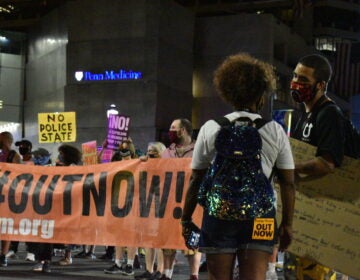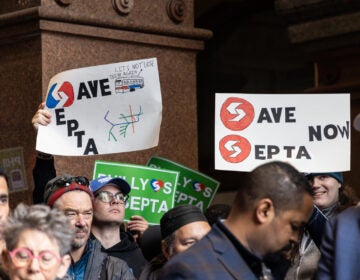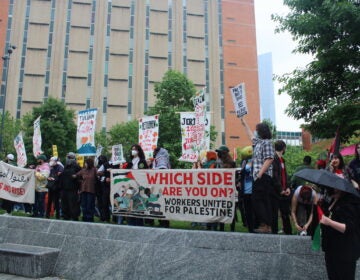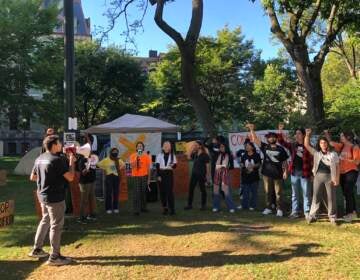Protesters continue fight for ‘police-free schools’ in Philly
The public fight to redirect $31 million spent on policing Philly students continued Saturday. Protesters want the money used for nurses and social workers.
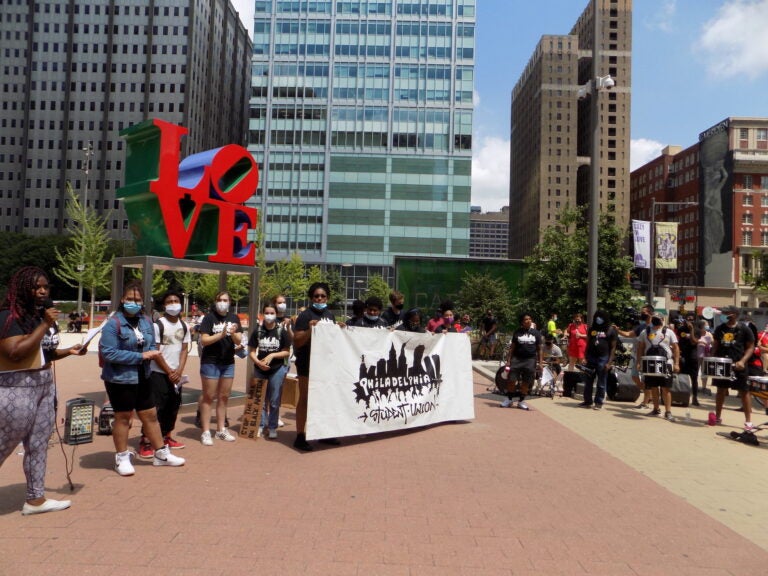
Hundreds of people marched from LOVE Park to school district headquarters to call for police-free schools. (Ximena Conde/WHYY)
The public fight to redirect $31 million spent on policing Philadelphia School District students continued Saturday. More than 200 supporters of “police-free schools” met at LOVE Park to demand those millions go to hire additional support staff instead.
“We want to have school nurses and counselors who are trained and gone through college to help children,” said Sanai Browning, an incoming 11th grader at Science Leadership Academy Beeber and a member of the Philadelphia Student Union. “Police have not been trained to do that.”
Browning said like many of her peers, she had a traumatizing encounter with police outside of school at a young age. She was getting pizza with a white friend and an officer stopped them.
“[He] said I shouldn’t be hanging around with my white friend because I would be mind tricking her into being a drug addict,” recalled Browning, who was 12 at the time, saying the incident has stayed with her.
Browning and others said they feel constant police scrutiny in their neighborhoods and on SEPTA. They think bringing policing into schools only chips away their sense of safety in what’s supposed to be a learning environment.
Protesters marched from the park to school district headquarters near Broad and Hamilton streets, making a stop at Philadelphia Family Court in between.
The march, put together by the Philadelphia Student Union, comes as calls to rid the district of its current 350-member unarmed security force – separate from the 100 police officers trained to respond to school calls — have gained visibility during the ongoing protests in the city calling for police reform.
About 200 ppl headed to school district HQ pic.twitter.com/zaRhW94iQQ
— Ximena Conde (@RadioXimena) July 25, 2020
Students have used virtual town halls and protests to describe how the current system of securing schools makes them feel criminalized and teaches them to fear those who are supposed to protect them.
What’s more, students argued having uniformed security and police officers readily available to respond to incidents at schools paved the way for students to get tangled in the court system.
“Young people are being forced into the court system through unfair policies, through criminalizing policies,” said Saudia Durrant, a PSU organizer, after the group protested in front of Philadelphia Family Court offices.
Zoe Sturges, who teaches at a charter school in North Philadelphia, has seen how children’s peccadillos — think fights or young people acting out — can suddenly feel egregious when police are added to the mix.
“No conflict was solved by scaring them,” she said. “I found out all kinds of things, like they had incarcerated family members or someone close to them had died. There’s always an underlying reason [for acting out], usually trauma or poverty.”
Just this school year, one of her students, who she lovingly calls munchkins, learned how to dial 911 from the school’s phone. The police came to the school and offered to “teach him a lesson.”
Police said putting the student in handcuffs and driving him around the block in their squad car would discourage a repeat of the incident.
School leaders responded with an emphatic no in this case, despite police objection, but that’s not always how school administrators respond.
At Henry C. Lea School in West Philadelphia the previous school year, officers arrested two of her fourth graders in math class because they got into a fight. The children were sparring, according to Sturges, over jealousy related to hair.
“They didn’t allow me to contact their family, they didn’t allow me to have detention, they didn’t allow me to have mediation,” she said.
For Sturges, the arrest of the fourth-grade girls exemplifies how policing can become the go-to solution for problems that should be addressed with counseling.
Retired Deputy Police Commissioner Kevin Bethel currently leads school security efforts in the district. Though he’s been a vocal opponent of arresting students for minor offenses and an advocate of using diversion services whenever possible, he has said a need for security remains.
Still, Bethel said changes are coming. Security members are getting new “softer” uniforms this school year, they’ll be called “school safety officers,” and undergo training.
For Qawyyah Powers, another incoming junior at Beeber, the small reforms and training are not enough.
Nurses and counselors have “years and years of their life spent on something that they want to do,” Powers said. The way she sees it, a week or month-long training won’t change the problem.
Durrant of PSU said that students and parents are tired of waiting.
“The school district works for us, not the other way around,” The organizer noted. “They’re supposed to work in the interest of what we want, and they’re not going to get us coming back to these schools unless they meet the demands of the community.”

Get daily updates from WHYY News!
WHYY is your source for fact-based, in-depth journalism and information. As a nonprofit organization, we rely on financial support from readers like you. Please give today.


